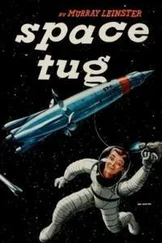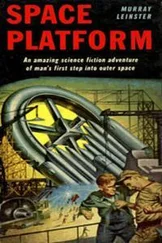The news story exploded. Let loose on an overcrowded planet which had lost all hope of relief after fifty years in which only the moon had been colonized—and its colony had a population in the hundreds, only—the idea of faster–than–light travel was the one impossible dream that everybody wanted to believe in. The story spread in a manner that could only be described as chain–reaction in character. And of course Dabney—as the scientist responsible for the new hope—became known to all peoples.
The experts of Kursten, Kasten, Hopkins and Fallowe checked on the publicity given to Dabney. Strict advertising agency accounting figured that to date the cost–per–customer–mention of Dabney and his discovery were the lowest in the history of advertising. Surveys disclosed that within three Earth–days less than 3.5 of every hundred interviews questioned were completely ignorant of Dabney and the prospect of travel to the stars through his discovery. More people knew Dabney's name than knew the name of the President of the United States!
That was only the beginning. The leading popular–science show jumped eight points in audience–rating. It actually reached top–twenty rating when it assigned a regular five–minute period to the Dabney Field and its possibilities in human terms. On the sixth day after Jamison's calculated indiscretion, the public consciousness was literally saturated with the idea of faster–than–light transportation. Dabney was mentioned in every interview of every stuffed shirt, he was referred to on every comedy show (three separate jokes had been invented, which were developed into one thousand eight hundred switcheroos, most of them only imperceptibly different from the original trio) and even Marilyn Winters—Little Aphrodite Herself—was demanding a faster–than–light–travel sequence in her next television show.
On the seventh day Bill Holden came into the office where Cochrane worked feverishly.
"Doctor Cochrane," said Holden, "a word with you!"
"Doctor?" asked Cochrane.
"Doctor!" repeated Holden. "I've just been interviewing my patient. You're good. My patient is adjusted."
Cochrane raised his eyebrows.
"He's famous," said Holden grimly. "He now considers that everybody in the world knows that he is a great scientist. He is appreciated. He is happily making plans to go back to Earth and address a few learned societies and let people admire him. He can now spend the rest of his life being the man who discovered the principle by which faster–than–light–travel will some day be achieved. Even when the furor dies down, he will have been a great man—and he will stay a great man in his own estimation. In short, he's cured."
Cochrane grinned.
"Then I'm fired?"
"We are," said Holden. "There are professional ethics even among psychiatrists, Jed. I have to admit that the guy now has a permanent adjustment to reality. He has been recognized as a great scientist. He is no longer frustrated."
Cochrane leaned back in his chair.
"That may be good medical ethics," he observed, "but it's lousy business practice, Bill. You say he's adjusted to reality. That means that he will now have a socially acceptable reaction to anything that's likely to happen to him."
Holden nodded.
"A well–adjusted person does. Dabney's the same person. He's the same fool. But he'll get along all right. A psychiatrist can't change a personality! All he can do is make it adjust to the world about so the guy doesn't have to be tucked away in a straight–jacket. In that sense, Dabney is adjusted."
"You've played a dirty trick on him," said Cochrane. "You've stabilized him, and that's the rottenest trick anybody can play on anybody! You've put him into a sort of moral deep–freeze. It's a dirty trick, Bill!"
"Look who's talking!" said Holden wearily. "I suppose the advertising business is altruistic and unmercenary?"
"The devil, no!" said Cochrane indignantly. "We serve a useful purpose! We tell people that they smell bad, and so give them an alibi for the unpopularity their stupidity has produced. But then we tell them to use so–and–so's breath sweetener or whosit's non–immunizing deodorant they'll immediately become the life of every party they attend! It's a lie, of course, but it's a dynamic lie! It gives the frustrated individual something to do! It sells him hope and therefore activity—and inactivity is a sort of death!"
Holden looked at Cochrane with a dreary disinterest.
"You're adjusted, Jed! But do you really believe that stuff?"
Cochrane grinned again.
"Only on Tuesdays and Fridays. It's about two–sevenths true. But it does have that much truth in it! Nobody ever gets anything done while they merely make socially acceptable responses to the things that happen to them! Take Dabney himself! We've got a hell of a thing coming along now just because he wouldn't make the socially acceptable response to having a rich wife and no brains. He rebelled. So mankind will start moving to the stars!"
"You still believe it?"
Cochrane grimaced.
"Yesterday morning I sweated blood in a space–suit out in the crater beyond Jones' laboratory. He tried his trick. He had a small signal–rocket mounted on the far side of that crater,—twenty–some miles. It was in front of the field–plate that established the Dabney field across the crater to another plate near us. Jones turned on the field. He ignited the rocket by remote control. I was watching with a telescope. I gave him the word to fire…. How long do you think it took that rocket to cross the crater in that field that works like a pipe? It smashed into the plate at the lab!"
Holden shook his head.
"It took slightly," said Cochrane, "slightly under three–fifths of a second."
Holden blinked. Cochrane said:
"A signal–rocket has an acceleration of about six hundred feet per second, level flight, no gravity component, mass acceleration only. It should have taken a hundred seconds plus to cross that crater—over twenty miles. It shouldn't have stayed on course. It did stay on course, inside the field. It did take under three–fifths of a second. The gadget works!"
Holden drew a deep breath.
"So now you need more money and you want me not to discharge my patient as cured."
"Not a bit of it!" snapped Cochrane. "I don't want him as a patient! I'm only willing to accept him as a customer! But if he wants fame, I'll sell it to him. Not as something to lean his fragile psyche on, but something to wallow in! Do you think he could ever get too famous for his own satisfaction?"
"Of course not," said Holden. "He's the same fool."
"Then we're in business," Cochrane told him. "Not that I couldn't peddle my fish elsewhere. I'm going to! But I'll give him old–customer preference. I'll want him out at the distress–torp tests this afternoon. They'll be public."
"This afternoon?" asked Holden. "Distress–torp?"
A lunar day is two Earth–weeks–long. A lunar night is equally long–drawn–out. Cochrane said impatiently:
"I got out of bed four hours ago. To me that's morning. I'll eat lunch in an hour. That's noon. Say, three hours from now, whatever o'clock it is lunar time."
Holden glanced at his watch and made computations. He said:
"That'll be half–past two hundred and three o'clock, if you're curious. But what's a distress–torp?"
"Shoo!" said Cochrane. "I'll send Babs to find you and load you on the jeep. You'll see then. Now I'm busy!"
Holden shrugged and went away, and Cochrane stared at his own watch. Since a lunar day and night together fill twenty–eight Earth days of time, a strictly lunar "day" contains nearly three hundred forty Earth–hours. To call one–twelfth of that period an hour would be an affectation. To call each twenty–four Earth hours a day would have been absurd. So the actual period of the moon's rotation was divided into familiar time–intervals, and a bulletin–board in the hotel lobby in Lunar City notified those interested that: " Sunday will be from 143 o'clock to 167 o'clock A.M. " There would be another Sunday some time during the lunar afternoon.
Читать дальше






